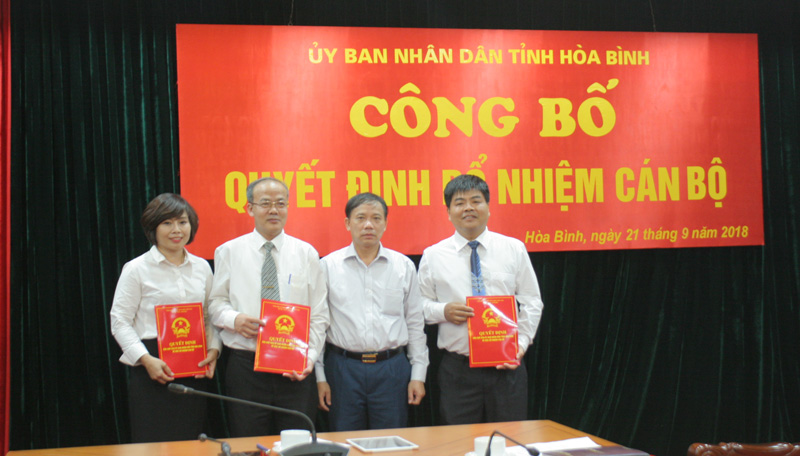
(HBO) – The People’s Committee of Hoa Binh province has recently held a ceremony to announce and hand over appointment decisions to two Deputy Directors of Planning and Investment, and a Deputy Director of the Radio and Broadcasting Station. Bui Van Khanh, Vice Chairman of the provincial People’s Committee, presided over the event.

Bui
Van Khanh, Vice Chairman of the provincial People’s Committee, hands over the
appointment decisions to the three officials.
At the ceremony, leaders of the Department of Home Affairs
announced the decisions of the People’s Committee on the appointment of Bui Thi
Hanh, head of the Foreign Economic Division, and Nguyen Van Phuc, head of the General
Planning Division, to the post of Deputy Director of Planning and Investment
for a five-year term each; and Nguyen Van Tien, head of the Current Affairs
Division to the post of Deputy Director of the Radio and Broadcasting Station.
The decisions took effect since the date of signing on September
20, 2018.
Addressing the event, Khanh said the department and the station
are two important agencies of the province.
Hoa Binh has been empowered to select department-level leaders
through competitions, he said, adding via the contests, selected officials have
proven their knowledge and capacity.
Khanh expressed his hope that the newly-appointed Deputy Directors
will make greater efforts in order to improve their leadership skills and
contribute to the province’s socio-economic development.
On behalf of the officials, Phuc pledged to continue improving
their professional knowledge and leadership capacity to successfully fulfill the
new tasks./.
Hoa Binh province is undergoing a dynamic transformation amid Vietnam’s national digital transition. Building on Poliburo’s Resolution No. 57-NQ/TW on breakthroughs in science, technology, innovation, and national digital transformation, the province has rolled out a wide range of practical action plans. A standout initiative is the "Digital Literacy for All” movement, an effort to ensure that no one is left behind in the digital era.
Hoa Binh province is undergoing a dynamic transformation in the wake of the national digital transformation movement. Building on Resolution No. 57-NQ/TW of the Politburo on breakthroughs in science, technology, innovation, and national digital transformation, the province has implemented a wide range of practical action plans. A standout initiative is the "Digital Literacy for All” movement ambitious effort to ensure that no one is left behind in the digital age.
With a spirit of unity and proactive problem-solving, the Party Committee, the government and the people of Dong Lai Commune (Tan Lac District) have made great strides in implementing the resolutions of the 24th Party Congress of the commune for the 2020 - 2025 term. Focusing on leadership and practical actions, the commune has brought the Party’s resolutions into daily life, creating strong impacts and pushing the local development forward.
Amid the nationwide push for digital transformation, young people in Hoa Binh Province are stepping up as dynamic pioneers, applying technology to enhance Youth Union operations and expand the reach of youth-led initiatives. Through creativity and adaptability, Youth Union organizations at all levels have introduced a series of practical solutions, contributing to modern governance and community development.
In recent years, An Nghia commune, located in Lac Son district, has stepped up administrative reform, focusing on improving the quality and efficiency of its single-window service unit for receiving and processing administrative procedures. These improvements have helped create favourable conditions for local residents and organisations to handle administrative procedures, contributing to the commune’s broader socio-economic development.
The Prime Minister-approved master plan to develop the multi-use value of forests ecosystems through 2030, with a vision to 2050, aims to improve the management and sustainable use of forest resources, create jobs, increase incomes, and improve the living standards of ethnic minorities, people in mountainous and remote areas, forest workers and those living near forests.



